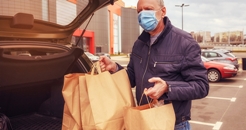 Let's continue to build community - food provision
Let's continue to build community - food provision
One of the most consistent features of the volunteer response to the pandemic has been how many people have stepped up to fill roles that aren't necessarily related to their professional experience. In every case, they've simply been asked to take on work and said yes.
Part of this response has been the supply of food to the most vulnerable and also to frontline staff who have not had a chance to get meals, etc. The number of children relying on food banks had doubled during the UK’s period of coronavirus lockdown due to loss of family income.
The government has provided £16m (so far) to 5,000 food charities to help people struggling to eat enough during the coronavirus pandemic. Newspapers have run fund appeals and many people in communities have donated to their local foodbank, etc. Church members and other volunteers have made delivery runs with food parcels. Local kitchens have made meals for delivery to frontline staff.
Let's consider some elements of this:
-
Food supply - could we help local small food retailers in the High Street or market traders through purchases and help our High Streets?
-
Meal supply - could we help local restaurants keep their kitchens open and workers employed as they prepare meals for frontline workers and impacted communities?
-
Distribution - could local charities urge people to buy donated food from local small businesses or collect donations and spend with local small retailers and restaurants in order to supply vulnerable people and frontline workers in the community?
Wouldn't lining up these elements be a win, win, win?
In our local efforts to obtain food donations, are these only focusing on the large supermarkets? In our efforts to cook meals, are we only focusing on charity kitchens? Could we change to a more holistic approach to further build community? I'm sure there are supportive deals to be done..
A couple of examples:
Regional market stall holders including Borough market in London and Bradford market have run a crowdfunding campaign - Feed the Frontline. They have raised £162,000 to provide key workers – NHS staff and carers – with healthy fresh food to support and nourish them as they work longer hours. They have delivered over 35,000 bags of fresh fruit and vegetables to several hospitals.
Meals for the NHS began back in March to support local hospitals battling COVID-19 and will close on 30th June. At the end of gruelling shifts, frontline NHS staff were faced with closed canteens and nothing to eat. 12 weeks after start, with the help of 100 volunteers, more than 200 local food providers, who were also in desperate need of an economic lifeline, and incredibly generous donations of £1.7+m, they’ve now delivered 225,000+ meals to 117 hospitals across the country.
This has also been mirrored in the USA with Frontline Foods. A nurse suggested to a contact that a pizza party might be a great way to boost morale on her unit at the end of a really tough hospital shift. It became reality In a matter of a few days and with the help of dedicated volunteers who donated time, energy, and skills. They realised that two issues brought about by COVID-19 could be tackled through a single programme: if restaurants could prepare meals for healthcare workers using money given to them through donations from the community, this would bring back business and keep their kitchens open, while also providing workers on the frontlines the fuel they need. Similar ideas had sparked all over the country and what began as independent efforts with a shared vision has become a unified movement. They are now serving 61 cities, 1,200 restaurants who have delivered 500,000 meals to 1,000 frontline teams.
As the pressure comes off of frontline staff, the economy still needs to be rebuilt and we will still have many people in our communities who need food, need a meal. Restaurants will be subject to social distancing measures and this will affect their income for some time. Foodbanks will be essential but could we take a more holistic approach?
Could local charities adapt some of the initiatives above to continue to build community?